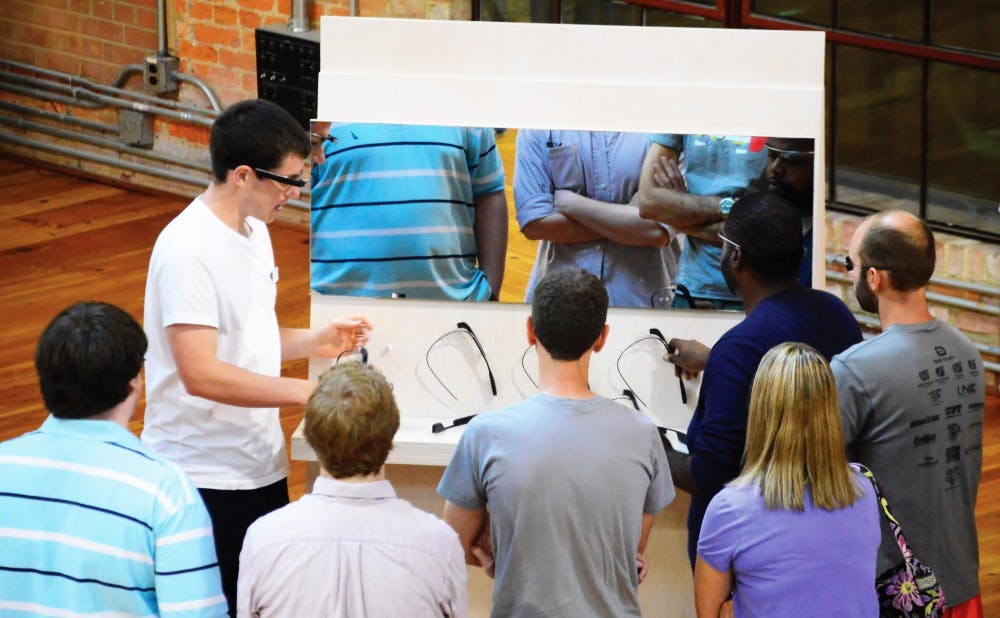The event allowed members of the general public to be introduced to the company's latest product, Google Glass—a computing system built on an eyeglass frame— and to spend a few minutes trying out a headset. Before Saturday, Glass had been used only by select testers and developers. Interest for the event was strong, with hundreds of attendees.
Durham was chosen as the tour's first location due to the research technology community in the area, said Devin
“Durham is a tech hub for innovation with the Research Triangle Park and all the other startups that you guys have out of here,” Buell said. “Google has a big presence—we have a datacenter in Lenoir and an office in Chapel Hill…. It was kind of a natural fit.”
Glass is a small computer with a projector and a prism mounted on a titanium eyeglass frame. It allows the wearer to see a virtual screen in their field of view and has voice, touch and movement controls, according to information given at the event.
“What we try to do with Glass is try to get people away from their phones and have them live in the moment,” said Glass Guide Laura Lin.
Although Glass might seem like an extra distraction, wearing the product as opposed to depending on a phone allows people to be more engaged with their surroundings, Lin said.
Glass is designed to be both immersive and peripheral at the same time. It is light enough that the wearer does not notice it after the first few seconds but it is available for use at any instant, The Chronicle's reporter found from using the device. Images are projected into a prism placed in front of the eye, allowing the wearer to see images as if they were in the upper-right portion of their field of view. The headsets respond to voice commands, head movements and finger gestures from a touchpad on the side of the headset.
Google has had about 10,000 “explorers” use Glass up until this point, Buell said. They are both testing the product and developing applications for it. Google does plan to make the product public in the near future, probably some time next year, Buell noted.
“We want to get it out there," he said. "It’s not something we only keep in the hands of explorers. It’s definitely going to be public."
The Durham event was a first step in that direction. Buell said that Google chose to start their Glass tour in Durham not only because of the Research Triangle's technology community and Google’s own presence nearby, but also the proximity to universities such as Duke and the University of North Carolina at Chapel Hill.
At the Durham event, attendees who had signed up in advance were given an overview of the Glass project by Glass Guides, instructed in how to use Glass and then allowed to put on a Glass headset for about seven minutes. Attendees tried Google searches, took pictures using Glass’ built in camera and tried out the navigation feature.
Attendance was high, with long lines forming at the door. Sign-ups closed several days before the event due to high demand. Most attendees appeared to be impressed with Glass.
“I thought it was awesome,” Nick Fulton, an employee at UNC, said.
The product was not perfect, however. In one demonstration, a Guide asked Glass to provide the score of the UNC-Virginia Tech football game—but the score for another game was pulled up instead.
Some attendees said that they had ideas for other possible applications and uses.
“It looks pretty interesting,” event attendee Randall Stroud said. “I’d like to try this synced with my phone, but today was sort of limited in what we were allowed to do.”
Ryan York, a Raleigh resident who works with law enforcement technology, said he saw great potential for the device.
“I see what it’s going to do and how it’s going to help us, mainly in respect to grouping information together and making it useful,” he said. “It would be very interesting if you and I were talking and I wanted your contact information and I could bring up your name, take a picture of you and automatically look you up.”
Get The Chronicle straight to your inbox
Signup for our weekly newsletter. Cancel at any time.

